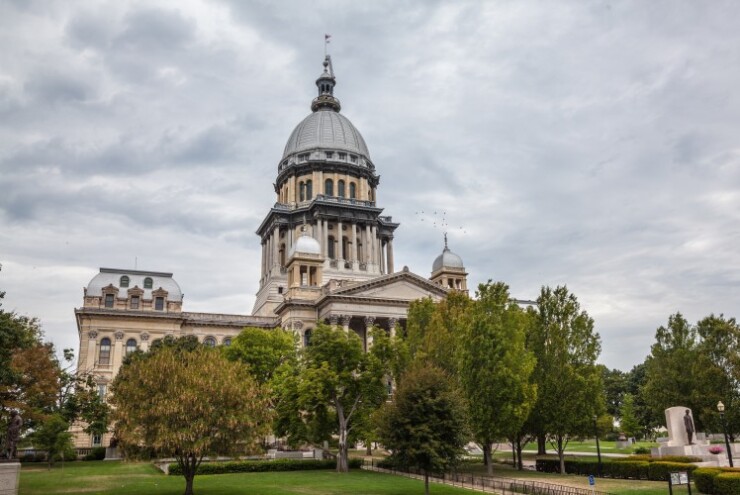The Illinois General Assembly is putting work on hold in an effort to slow the spread of the COVID-19 outbreak.
The House and Senate Wednesday announced the cancellation of committee meeting and floor sessions scheduled for next week.
Among the issued placed on hold are the state's fiscal 2021 budget and casino tax changes.
The General Assembly was scheduled to be in session for three weeks followed by a two week spring break.
Illinois reported 25 cases as of Wednesday. Gov. J.B. Pritzker has issued a disaster proclamation to free up state and federal resources. The administration and local officials have been providing daily updates. The state expects growing numbers now that it’s begun to see “community spread” of the virus.

“Given the recommendations for social distancing as a safeguard to slow the spread of this virus, the Illinois Senate is going to do its part. The Friday, March 20 session day had already been cancelled. The Senate will also cancel the March 18 and 19 session days,” Senate President Don Harmon, D-Oak Park, said in a statement. “We will constantly monitor the situation and make future decisions based on best practices and advice from the state’s public.”
The House also canceled next week’s session and scheduled committee hearings.
Illinois lawmakers are working on a fiscal 2021 budget that is expected to pass before the session’s scheduled end in May. Pritzker has proposed a $42 billion general fund with $1.4 billion contingent on passage in November of a constitutional amendment allowing the state to move to a progressive income tax structure from the current flat one.
Pritzker, with the support of his fellow Democrats who hold a legislative majority, would raise taxes on top earners to generate about $1.4 billion in fiscal 2021 and then $3.6 billion going forward. Pritzker has received some pushback from Democrats on the spending holdbacks including cuts to a scheduled increase in education aide and local government revenue sharing cuts.
Chicago Mayor Lori Lightfoot is banking on spring passage of tax changes to a proposed Chicago casino that are needed to attract private financing. The city is banking on eventually collecting several hundred million a year from a casino to help reach structural budget balance.
Legislative aides said March 27 is the deadline to pass substantive bills out of committee to ready them for a floor vote but that deadline can be extended if needed and decisions will be made day-to-day.
The impact of the new coronavirus on other Midwest state legislatures has been mixed so far.
For those that operate on two-year budgets and approved operating spending plans last year, the pressure is lessened. For some states, like Illinois, a delay in budget passage could be addressed in a special session although a higher vote threshold is then required for approval.
Minnesota legislative hearings were continuing on Thursday, but legislative sources said an announcement on upcoming session days was expected later in the day. The legislature is currently scheduled to be in session until a break from April 3 to April 13.
The Minnesota legislature passed a two-year operating budget last year so this year is working on the capital plan known as the bonding bill.
Gov. Tim Walz has proposed a $2 billion plan. Lawmakers also are slated to debate a supplemental budget package following the announcement last month of a $1.5 billion surplus.
Walz on Thursday unveiled a supplemental budget he said protects the state’s “fiscal stability.”
It calls for reserves to be replenished to a $2.359 billion level. It spends another $346 million and leaves a balance of $1 billion. “When combined with the $2.359 billion in the budget reserve, the governor is leaving over $3.4 billion to cushion against risk in our forecast,” budget officials said.
The Michigan House and Senate remained in session Thursday. The current session runs through March 26 and breaks until April 14.
Indiana, which passed its two-year budget last spring so had more limited work planned this year, concluded its session this week.
The Missouri Senate said this week it would shutter for two weeks while the House said it would fast-track work on a $31 billion fiscal 2021 budget with the goal of finishing up by March 20. The chambers planned a 10-day break beginning late next week. The legislature typically wraps up work on a budget in the spring for the fiscal year beginning July 1.
Nebraska lawmakers, who are working on budget adjustments, were in session Thursday but with a scheduled recess until Tuesday’s return. A legislative aide said it was announced Thursday that a technical adjustment in how the legislature adjourned would allow officials to reassess the situation Monday and potentially cancel the session. A trigger for cancellation could be a case of “community spread” at the state capital, the aide said.
Wisconsin lawmakers, who last year approved a two-year budget, were holding committee hearings Thursday and legislative aides said officials were weighing the status of upcoming legislative meetings following Gov. Tony Evers declaration of a public health emergency Thursday. The state reported five new cases this week and has 37 residents returning from the Grand Princess cruise ship who will require monitoring, Evers said. Wisconsin can hold electronic meetings under its rules.
Ohio lawmakers are currently on a spring break and still scheduled to return the week of March 23.





